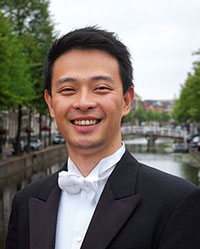He obtained a PhD degree in laboratory astrophysics at LU in 2018, and his doctoral thesis focused on the interstellar origin of (complex) organic molecules in dark, dense clouds. He was a postdoctoral researcher at the Max-Planck-institute for Astronomy/ Friedrich-Schiller-Universität Jena in Germany and studied the energetic processing of interstellar carbonaceous dust grains, ice, and their interface in astronomically relevant conditions.
In December 2020, Ko-Ju Chuang started working at Leiden Observatory, and the current research interest is interstellar dust and ice physicochemical evolution induced by non-energetic and energetic processing in star-forming regions.

Dr. K. Chuang
+31 71 527 5727
chuang@strw.leidenuniv.nl
Leiden Observatory / HL516b
Visitor address: Niels Bohrweg 2, NL-2333 CA Leiden
Postal address: PO Box 9513, NL-2300 RA Leiden
Ko-Ju’s research experience is in the field of laboratory astrophysics. Over the last ten years, he used several experimental UHV setups located in Leiden (NL), Jena (DE), and Taoyuan (TW) to understand and to quantitatively characterize chemical processes taking place on icy dust grains in the inter-and circumstellar medium. The focus of his research has been in investigating low temperature (~10 K) solid-state reactions triggered by atom additions or upon UV irradiation, using both state-of-art equipment and light from large scale facilities, such as the Taiwan Synchrotron (NSRRC). Three recent highlights of his work include i) the proof that small sugars and sugar alcohols can effectively form upon CO hydrogenations, ii) reaction excess energy offers a non-dissociative mechanism to transfer complex organic molecules (COMs) formed in the solid state into the gas phase and iii) the synthesis of interstellar carbonaceous dust analogs and their interface chemistry with icy molecules.